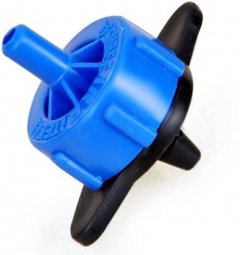Introduction:
When it comes to agricultural and gardening practices, efficiency and sustainability are essential. One of the most effective ways to achieve both of these goals is through the use of drip irrigation systems. In this blog post, we will explore the numerous advantages of drip irrigation and how it can revolutionize the way you water your plants.
1. Water Efficiency:
Drip irrigation is a highly efficient watering method that minimizes water waste. Unlike traditional overhead sprinklers, which can result in significant evaporation and runoff, drip irrigation delivers water directly to the roots of plants. The slow and targeted application of water ensures that plants receive exactly what they need without any excess.
2. Conservation of Resources:
With increasing concerns about water scarcity and environmental impact, drip irrigation plays a significant role in resource conservation. By using water efficiently and avoiding runoff, drip systems help conserve this precious resource. Additionally, drip irrigation also aids in reducing the use of fertilizers and pesticides, as they can be applied directly to the root zone, minimizing runoff and potential environmental contamination.
3. Customized Watering:
Drip irrigation systems allow for precise control over the amount of water delivered to each plant and can be customized to meet the individual needs of different plant varieties. By adjusting the flow rate and distribution, plants can receive water at a rate optimal for their growth stage, reducing the risk of over or under-watering.
4. Weed and Disease Management:
Traditional irrigation methods can inadvertently promote weed growth due to the widespread application of water across the entire surface. Drip irrigation targets the root zone, effectively reducing weed germination and growth. Additionally, since the foliage remains dry, the risk of fungal diseases, such as mildew or leaf spot, is significantly minimized.
5. Improved Plant Health and Productivity:
Drip irrigation provides a consistent and oxygen-rich environment for the plants’ root systems. By optimizing soil moisture levels and reducing stress caused by inconsistent watering, plants experience improved nutrient uptake, healthier root development, and increased overall productivity. This can lead to better crop yields and healthier gardens.
6. Time and Labor Savings:
The automation and efficiency of drip irrigation systems can save significant time and labor compared to manual watering methods. Once properly installed, drip systems can be automated with timers and sensors to control watering schedules, ensuring that plants receive water consistently without the need for manual intervention.
Conclusion:
Incorporating drip irrigation into your gardening or agricultural practices can bring countless benefits, from water conservation and increased efficiency to healthier plants and improved yields. By embracing this sustainable watering technique, you are not only enhancing your own productivity but also contributing to a greener and more environmentally conscious society. Make the switch to drip irrigation today and start enjoying the advantages it has to offer.

